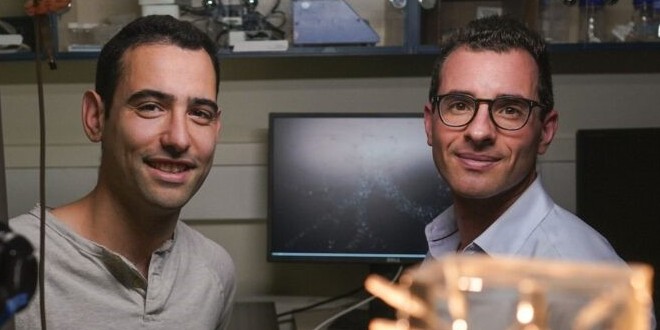Babies that are born prematurely are delicate and at high-risk for complications, developmental deficits and even their survival. Unprepared for the world that welcomes it and needing help even to breathe, such infants as fetuses in the uterus receive oxygen from the mother through the umbilical cord. Once born, the newborn must breathe independently.
Many premature babies with underdeveloped lungs require mechanical ventilation. The more prematurely the baby is born, the longer they will need artificial breathing.
Using a 3D model of the babies’ upper airways, the research team of Prof. Josué Sznitman of the Faculty of Biomedical Engineering at the Technion-Israel Institute of Technology in Haifa discovered that due to shear forces caused by the air jet from the mechanical ventilator, cells in the airways display stress, and an inflammation process begins.
Following this discovery, the researchers successfully tested the use of an anti-inflammatory drug commonly used to help asthma patients to prevent the damage caused by the ventilator.
About one in 10 babies around the world is born prematurely. In high-income countries, countries, most premature babies survive, but despite significant advances in the care of premies and improved ventilation technologies, many suffer from lifelong disabilities of varied severity.
One problem faced by pediatricians and nurses in premature baby units is how to offset adverse side effects of invasive mechanical ventilation, which is vital for maintaining the lives of babies who are incapable of breathing independently.
Today, the impact of ventilation on patient health and the fundamental mechanisms causing damage is still not fully understood, thus presenting an obstacle to developing solutions. Sznitman’s team confronted these challenges by combining expertise in physics, physiology and biology.
In a study published last year in the Journal of the Royal Society Interface under the title “Ventilation-induced epithelial injury drives biological onset of lung trauma in vitro and is mitigated with prophylactic anti-inflammatory therapeutics,” Sznitman and his then- doctoral student Dr. Eliram Nof identified an airflow phenomenon largely unnoticed in medical literature: a jet structure originating in the tube inserted into the trachea during mechanical ventilation.
Using a model based on fluid dynamics, they discovered regions of elevated shear stress that could potentially cause damage to the epithelial cell lining of the respiratory tract. Calculations revealed significant risks of injury from these forces, which was especially worrisome if exposed for lengthy periods in fragile patients such as premature babies.
In a follow-up study recently published in Bioengineering & Translational Medicine, the researchers tested their new model featuring an artificial human lung epithelium. The team constructed a 3-D model of the upper respiratory tract, including the trachea and several branched airways. They then cultured a layer of human lung epithelial cells in the model’s inner lumen, tracking their effects following mechanical ventilation. In doing so, they saw that the cells displayed stress and released cytokines – signaling proteins that influence inflammation.
Following this discovery, the group looked for means to reduce or prevent the damage. The medication Montelukast, sold under the brand name Singulair, is commonly used for treating asthma patients. They found that topical delivery of the medication (applying medication to the skin or mucous membranes) before starting mechanical ventilation considerably reduced cell death, It also altered the secretion of inflammation-related signaling proteins (cytokines). Repurposing an existing, fully approved drug saves the vast resources and time required for developing new medication, allowing for faster and easier adoption in other clinical uses, the authors said.
“Today, we know that artificial ventilation incurs various trauma to the respiratory system despite being an established, life-saving procedure,” explained Sznitman. “Much of this damage has been attributed to mechanical factors such as high pressure and distention of deep lung tissue. In recent years, new insights into more complex processes have emerged. In the current study, we demonstrated in vitro the start of an inflammatory response at the core of morbidity in invasively ventilated infants. We linked the flow-induced shear stresses to inflammation by measuring cytokines, the messengers of the immune system, and tracking epithelial cell health.”
Death rates among patients of all ages, not only premature babies, who suffer from acute respiratory failure remain perplexingly high despite the maintenance of blood oxygen equilibrium during mechanical ventilatory support. When the COVID-19 epidemic began, countries were racing to acquire ventilators. Soon, however, patients requiring prolonged respiratory support were developing inflammation and dying. Medical personnel started making every effort to postpone putting patients on ventilators, even when the patients were struggling to breathe on their own.
The findings of Sznitman’s group could improve their survival chances and help patients suffering from other conditions, such as COPD, that necessitate prolonged mechanical ventilation.
The methodology they used is of particular interest, as when they modelled the upper airways, they uncovered the mechanism of a harmful effects and proposed treatment, all without requiring animal studies. While animal testing cannot be eliminated from medical research entirely, advanced technologies permit scientists to use other means for earlier stages. Besides reducing the suffering of animals, such methodologies allow scientists to obtain results faster, at a lower cost and with reduced confounding factors, thus speeding up research.
The shortcode is missing a valid Donation Form ID attribute.




